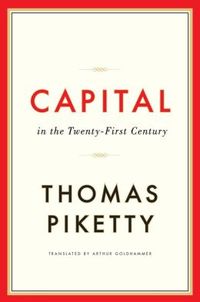

Purchase
Capital In The Twenty-First Century
Thomas Piketty
Harvard Business Review
March 2014
On Sale: March 10, 2014
696 pages
ISBN: 067443000X
EAN: 9780674430006
Kindle: B00I2WNYJW
Hardcover / e-Book
Add to Wish List
Non-Fiction
What are the grand dynamics that drive the accumulation and
distribution of capital? Questions about the long-term
evolution of inequality, the concentration of wealth, and
the prospects for economic growth lie at the heart of
political economy. But satisfactory answers have been hard
to find for lack of adequate data and clear guiding
theories. In Capital in the Twenty-First Century,
Thomas Piketty analyzes a unique collection of data from
twenty countries, ranging as far back as the eighteenth
century, to uncover key economic and social patterns. His
findings will transform debate and set the agenda for the
next generation of thought about wealth and inequality. Piketty shows that modern economic growth and the diffusion
of knowledge have allowed us to avoid inequalities on the
apocalyptic scale predicted by Karl Marx. But we have not
modified the deep structures of capital and inequality as
much as we thought in the optimistic decades following World
War II. The main driver of inequality--the tendency of
returns on capital to exceed the rate of economic
growth--today threatens to generate extreme inequalities
that stir discontent and undermine democratic values. But
economic trends are not acts of God. Political action has
curbed dangerous inequalities in the past, Piketty says, and
may do so again. A work of extraordinary ambition, originality, and rigor,
Capital in the Twenty-First Century reorients our
understanding of economic history and confronts us with
sobering lessons for today.
Comments
No comments posted.
Registered users may leave comments.
Log in or register now!
| 


 © 2003-2024 off-the-edge.net
all rights reserved Privacy Policy
© 2003-2024 off-the-edge.net
all rights reserved Privacy Policy